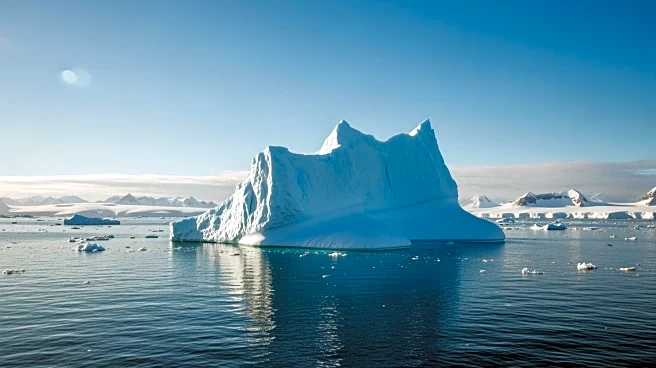What's Happening?
The Southern Ocean, a critical component in the global climate system, has been absorbing significant amounts of carbon dioxide and excess heat generated by human activities. Recent research by Ivy Frenger and colleagues, published in AGU Advances, suggests
that if global temperatures were to decrease due to net negative carbon emissions, the Southern Ocean might release accumulated heat in a sudden event termed an 'oceanic burp.' This phenomenon could occur over a decadal to centennial timescale, leading to a period of warming comparable to historical anthropogenic rates. The study utilized the University of Victoria climate model to simulate interactions between the ocean and atmosphere under these conditions, highlighting the Southern Ocean's dynamic role in carbon and heat uptake.
Why It's Important?
The potential release of heat from the Southern Ocean could have significant implications for global climate patterns. As the ocean has absorbed a substantial portion of human-induced carbon emissions and heat, its sudden release could counteract efforts to mitigate climate change. This scenario underscores the complexity of climate systems and the need for comprehensive models to predict future changes. Stakeholders in environmental policy, climate science, and global governance must consider these findings to develop strategies that address both current emissions and potential future scenarios. The study emphasizes the importance of monitoring the Southern Ocean's behavior as part of broader climate change mitigation efforts.
What's Next?
Further research is needed to understand the Southern Ocean's role in the global climate system, particularly its potential to release heat in a cooling world. Scientists may focus on refining climate models to better predict these interactions and assess the implications for global warming mitigation strategies. Policymakers and environmental organizations might prioritize monitoring changes in the Southern Ocean to anticipate and respond to potential climate shifts. Collaborative efforts between international climate bodies could be essential in addressing the challenges posed by this phenomenon.
Beyond the Headlines
The study highlights the ethical and scientific challenges in predicting and managing complex climate systems. As the Southern Ocean's behavior could influence global climate policies, it raises questions about the adequacy of current models and the need for interdisciplinary approaches in climate science. The potential heat release also underscores the interconnectedness of global ecosystems and the importance of international cooperation in addressing climate change.
















